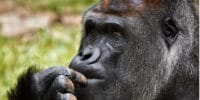Gorillas At Risk Of Catching Covid 19
Covid is not just a disease affecting humans, but animals too. Cats, lions, tigers, mink, and dogs are known to have been infected. Now gorillas too can be added to that list after 3 gorillas in San Diego zoo tested positive in January this year.
Medical assistance required
The infected animals likely caught the virus from a keeper. They recovered with medical assistance. Given primates are so similar to humans it is not surprising that gorilla’s can catch it. Now the worry is that gorillas, chimpanzees, orang-utans and other primates could catch it in the wild.
Tourism causing risk
One of the primary concerns is with tourists visiting gorillas in Uganda, Rwanda and Democratic Republic of Congo. The tourists get very close when taking photos, closer than they are supposed to, and close enough to spread viruses such as coronavirus.
The gorillas are used to humans being present but the tourists are ignoring the distance guidelines. Seven metres is the recommended distance by the IUCN for ape tourism, and in light of the pandemic they have suggested face masks are also worn. All three countries operating gorilla tourism try and enforce the seven metre rule but only the Democratic Republic of Congo require face masks to be worn.
Gorilla tourism still happening
Despite international travel being severely limited during the pandemic, gorilla tourism is still operating, albeit reduced. However, the rules need to be enforced as the risk to the gorillas is great. The majority of those involved in gorilla conservation and tourism don’t want to stop the tourists coming as they are an important part of conservation efforts, but the safety and health of the gorillas has to be put first.
The bottom line is that tourism boosts primate conservation. It supports the local economy and also keeps poachers away as tourists come to the areas where apes are and show that it is better value to locals in having tourist income versus poaching income.
Humans regularly transmit disease to apes. Respiratory illnesses are particularly bad and can be fatal to apes. If wild apes caught Covid it could be devastating as they won’t have the medical care that the San Diego gorillas had. The spread would be fast due to the close family groups.
Researchers adopting new methods
Researchers haven’t been able to travel to the gorillas to see if tourists are obeying distancing rules, but they have been able to compile data based on photos posted online. They have been able to study tourist ‘selfies’ with wild gorillas in the recent months and can see that the seven metre rule is not always obeyed, and in some recent photos people have been close enough to touch the animals.
In the Democratic Republic of Congo gorilla tourism photos show that 65% of people wear face masks. In Uganda and Rwanda face masks aren’t required to be worn by the gorilla tourists so no-one is wearing them. Comprehensive assessment within the countries is not available at present, but the photographic data gives an indication of what is going on.
A small amount of research is currently being done in the field by scientists joining tourist groups. It has highlighted many instances where tourists have sneezed, coughed or spat within short distances of primates, not to mention touching the vegetation, which isn’t outlined as an issue but is an obvious way of transmitting a virus such as Covid.
Potential positive impact
The pandemic could have a positive impact though. It could lastingly improve the consideration of the gorilla’s health amongst tourist parties. More care about our impact on surroundings can’t be a bad thing. Face masks may become the norm for viewing primates and other animals. There needs to be a heightened culture of responsibility for tourism around gorillas and all other primates.
If you would like to learn more about what you can do to help gorilla conservation please visit our Adopt a Gorilla page.


